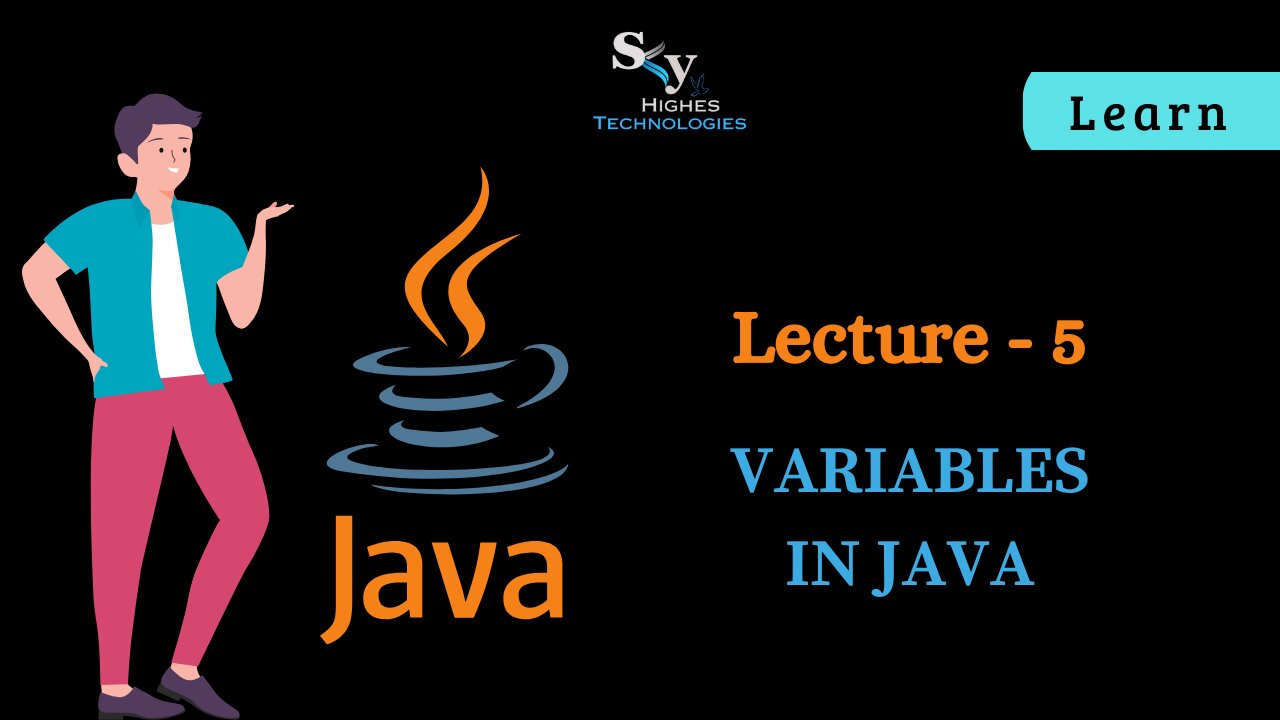Premium Only Content

#5 Variables in JAVA | Skyhighes | Lecture 5
Here's a description of variables in Java, incorporating images for clarity:
What are Variables?
Think of variables as named containers that store data values during program execution.
They're like labeled boxes in your program's memory, holding information that can be used and manipulated later.
Image of labeled boxes representing variables in memoryOpens in a new window
w3.cs.jmu.edu
labeled boxes representing variables in memory
Declaring Variables:
You must declare a variable before using it. This involves:
Specifying its data type: This tells Java what kind of value the variable can hold (e.g., number, text, true/false).
Giving it a name: Choose a meaningful name that reflects its purpose.
Example:
Java
int age = 25; // Declares a variable named "age" of type "int" and assigns the value 25
String name = "Alice"; // Declares a variable named "name" of type "String" and assigns the value "Alice"
Use code with caution. Learn more
Data Types:
Java has two main types of data types:
Primitive data types: Hold simple values directly in memory.
Examples: int, double, char, boolean, float, byte, short, long
Reference data types: Hold references to objects in memory.
Examples: String, Array, Class
Assigning Values:
You can assign values to variables using the = operator.
Example: int score = 95;
Using Variables:
Once declared and assigned, you can use variables in your code to perform calculations, create output, make decisions, and more.
Example: System.out.println("Your age is: " + age);
Key Points:
Case sensitivity: Variable names are case-sensitive (age is different from Age).
Naming conventions: Use descriptive names to make your code readable (e.g., firstName instead of x).
Scope: Variables have a scope, which determines where they can be accessed within your code.
Types cannot change: Once declared, a variable's data type cannot be changed.
Image of common primitive data types in Java
Remember, variables are essential building blocks for storing and managing data in your Java programs. Choose appropriate data types, meaningful names, and consider variable scope to write clear and effective code.
-
 LIVE
LIVE
The Bubba Army
2 days agoCharlie Kirk's Shooter, Had a Trans BF? - Bubba the Love Sponge® Show | 9/15/25
4,844 watching -
 3:38:49
3:38:49
Badlands Media
1 day agoThe Narrative Ep. 38: The Sovereign World
113K58 -
 2:57:44
2:57:44
The Charlie Kirk Show
12 hours agoWASHINGTON D.C. PRAYER VIGIL FOR CHARLIE KIRK
243K455 -
 14:11
14:11
Robbi On The Record
13 hours agoThe Trap of Identity Politics: How Division is Killing America
26.5K43 -
 1:29:23
1:29:23
Nerdrotic
13 hours ago $19.49 earnedThe Turning Point | New UFO Video with Michael Collins | Forbidden Frontier #117
87.5K29 -
 1:08:26
1:08:26
Sarah Westall
10 hours agoSuicide Pacts forming in Youth Social Media Groups - Discord, Reddit, TikTok w/ John Anthony
77.4K26 -
 2:25:31
2:25:31
vivafrei
21 hours agoEp. 281: Charlie Kirk; Routh Trial; Charlotte Train; Bolsanaro Defense; SCOTUS & MORE!
157K244 -
 2:55:38
2:55:38
Turning Point USA
12 hours agoWASHINGTON D.C. PRAYER VIGIL FOR CHARLIE KIRK
110K44 -
 35:54
35:54
The Mel K Show
12 hours agoMel K & Tim James | Healing is an Inside Job | 9-14-25
81.1K4 -
 3:06:33
3:06:33
IsaiahLCarter
15 hours ago $15.93 earnedCharlie Kirk, American Martyr (with Mikale Olson) || APOSTATE RADIO 028
84.9K30